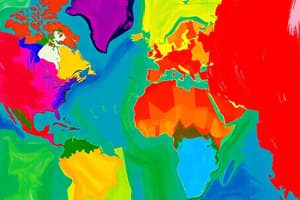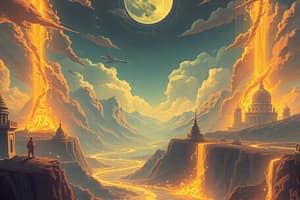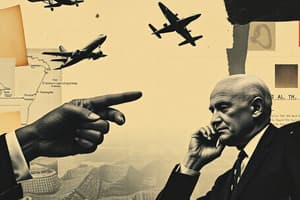Podcast
Questions and Answers
What is politics, according to Hans Morgenthau?
What is politics, according to Hans Morgenthau?
- A struggle for social justice
- A struggle for economic growth
- A struggle for peace among nations
- A struggle for power over men (correct)
What is the core assumption of human nature in the theory of power politics?
What is the core assumption of human nature in the theory of power politics?
- Rationality is the defining characteristic of human nature
- Egoism is the defining characteristic of human nature (correct)
- Altruism is the defining characteristic of human nature
- Morality is the defining characteristic of human nature
What is the equation that summarizes the core theme of realist theory?
What is the equation that summarizes the core theme of realist theory?
- Egoism plus anarchy equals power politics (correct)
- Altruism plus cooperation equals social welfare
- Rationality plus morality equals justice
- Egoism plus cooperation equals peace politics
What is a key theme within realist theory?
What is a key theme within realist theory?
What is a characteristic of liberalism in international relations?
What is a characteristic of liberalism in international relations?
What is a similarity between realism and liberalism in international relations?
What is a similarity between realism and liberalism in international relations?
What is international anarchy, according to the theory of power politics?
What is international anarchy, according to the theory of power politics?
What is a theme that is distinct from realism in international relations?
What is a theme that is distinct from realism in international relations?
Which critical theory is concerned with exposing capitalism as a system of class oppression?
Which critical theory is concerned with exposing capitalism as a system of class oppression?
What is the core of Marxism philosophy?
What is the core of Marxism philosophy?
How does history move forward according to Marxism and neo-Marxism?
How does history move forward according to Marxism and neo-Marxism?
What is the final stage of historical development according to Marxism and neo-Marxism?
What is the final stage of historical development according to Marxism and neo-Marxism?
What are the different stages of historical development according to Marxism and neo-Marxism?
What are the different stages of historical development according to Marxism and neo-Marxism?
What is an example of critical theory on International Relations?
What is an example of critical theory on International Relations?
What is Chanakya primarily concerned with?
What is Chanakya primarily concerned with?
Which philosopher is known as the Father of Liberalism?
Which philosopher is known as the Father of Liberalism?
Who is famous for his attacks on the established Catholic Church?
Who is famous for his attacks on the established Catholic Church?
According to John Locke, what are the three inalienable rights?
According to John Locke, what are the three inalienable rights?
What is the main focus of critical theories on international relations?
What is the main focus of critical theories on international relations?
What is Immanuel Kant's political philosophy described as?
What is Immanuel Kant's political philosophy described as?
What is the primary role of the state, according to Immanuel Kant?
What is the primary role of the state, according to Immanuel Kant?
When did critical perspectives on international relations start to gain prominence?
When did critical perspectives on international relations start to gain prominence?
What do critical theories of IR have in common?
What do critical theories of IR have in common?
What is the second similarity among critical theories of IR?
What is the second similarity among critical theories of IR?
What do critical theorists tend to view realism and liberalism as?
What do critical theorists tend to view realism and liberalism as?
What is the primary goal of critical theories of IR?
What is the primary goal of critical theories of IR?
What do critical theorists seek to achieve by exposing inequalities and asymmetries?
What do critical theorists seek to achieve by exposing inequalities and asymmetries?
What is the primary focus of critical theories of IR?
What is the primary focus of critical theories of IR?
What is the main characteristic of wars and crimes according to Marxist and neo-Marxist theories?
What is the main characteristic of wars and crimes according to Marxist and neo-Marxist theories?
What is the focus of later Marxists in the context of global capitalism?
What is the focus of later Marxists in the context of global capitalism?
What is the concept that replaced traditional imperialism in the post-1945 period?
What is the concept that replaced traditional imperialism in the post-1945 period?
What are the three components of the world-system theory?
What are the three components of the world-system theory?
What is the main focus of dependency theory?
What is the main focus of dependency theory?
What is the relationship between the core and the periphery in the world-system theory?
What is the relationship between the core and the periphery in the world-system theory?
Flashcards are hidden until you start studying
Study Notes
Theories of International Relations
- Politics is a struggle for power over men, and power is the immediate goal of political action (Hans Morgenthau)
- The theory of power politics is based on two core assumptions: people are essentially selfish and competitive, and the state-system operates in a context of international anarchy.
Realism
- The core theme of realist theory can be summed up as "egoism plus anarchy equals power politics"
- Key themes within realism include:
- State egoism and conflict
- Statecraft and the national interest
- International anarchy and its implications: polarity, stability, and the balance of power
Liberalism
- States may pursue self-interest, but a natural equilibrium will tend to assert itself
- Competing interests complement one another, and conflict is never irreconcilable
- Liberalism is not clearly distinct from realism, as both share mainstream assumptions about international politics
Realist Thinkers
- Chanakya, an Indian philosopher, focused on the security of the state against external threats and internal harmony
Liberal Thinkers
- Voltaire, a French philosopher, advocated for freedom of religion, freedom of expression, and separation of church and state
- John Locke, an English philosopher, is considered the Father of Liberalism, propounding principles like recognition of rights, democracy, limited state, and toleration
- Immanuel Kant, a German philosopher, believed that the state is not an impediment to freedom, but rather a means to achieve it
Critical Theories on IR
- Critical perspectives challenge mainstream perspectives on international politics and world affairs
- They have two broad similarities: they embrace a post-positivist approach, and they seek to challenge the global status quo and the norms, values, and assumptions on which it is based
- Critical theorists tend to view realism and liberalism as ways of concealing or legitimizing power imbalances in the established global system
Critical Theories
- Marxism and neo-Marxism: concerned with exposing capitalism as a system of class oppression that operates on national and international levels
- Social constructivism, poststructuralism, feminism, green politics, and postcolonialism are other critical theories in IR
- Marxism and neo-Marxism focus on the dialectical process of history, driven forward by internal contradictions within each mode of production
- Neo-Marxism includes dependency theory, which highlights the extent to which traditional imperialism has given way to neo-colonialism
Studying That Suits You
Use AI to generate personalized quizzes and flashcards to suit your learning preferences.




